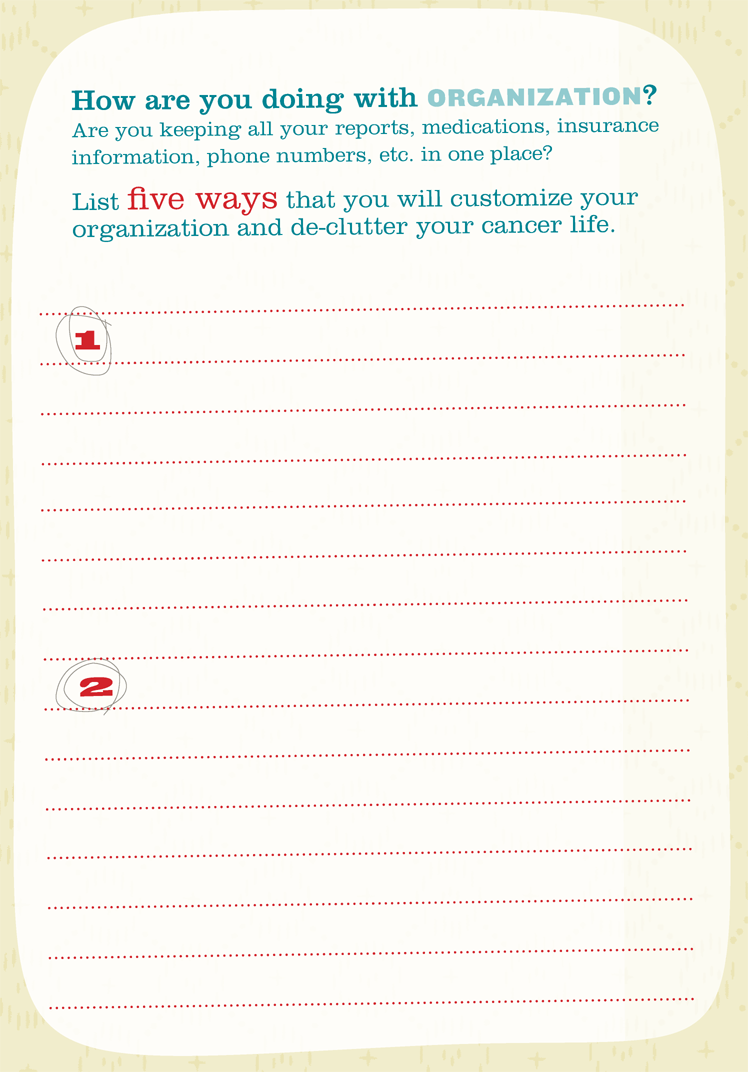

Getting organized and setting clear goals will give you peace of mind, help you feel in control, and set you on the path of creating an effective game plan. The Internet is a great place to start learning about your cancer, but it can also be very overwhelming. Move cautiously. Ask a pal to help if you need to. The top ten cancer hospitals are listed online yearly as well as many other useful institutions.
Julie Larson, a young adult services program coordinator with CancerCare (and overall fabulous gal), shares some great advice on how to navigate the Web as well as helpful tips for getting it together CEO style. Hit it, Julie!
TV commercials, news stories, advice from well-meaning friends and family offering their opinion—it all adds up to what people with cancer describe as “too many voices.” If you make the decision to dive into the Internet for more information, you may begin wondering, “Can I trust this Web site?” Here is a list of important questions to ask that may help you rely on the information or at least think about it in an informed way.
- What is the purpose of the Web site—educational or commercial? For example, a site sponsored by a pharmaceutical company isn’t likely to give you unbiased information about a competing drug. But because that site must meet Food and Drug Administration (FDA) standards, it will be an excellent source on a particular product.
- What is the source of the information? Generally, nationally known cancer centers, medical schools, large nonprofit organizations, and government agencies provide the highest-quality information.
- Are you able to find contact information for the people behind the Web site? If you can’t communicate with them, find another source.
- Are the links relevant and appropriate for the site? Sites that refer you to unreliable or frankly commercial sources of information should be rejected.
I always recommend that people focus all their notes, contact, and appointment information in one centralized place. You don’t need anything fancy; a simple notebook from the drugstore and a calendar will do the job. Record the name, contact number, date, and a few short notes from important conversations. Begin a calendar for appointments and reminders for when you take medicine.
Use a designated folder and notebook for all your medically related information so everything is organized in one place. Write down questions as they come to you, especially the ones that wake you up in the night. Getting answers to your questions will remove some of the uncertainty and help you feel more in control. Take notes during doctor visits, or ask a family member or good friend to be your secretary during these appointments.
Also, start a log to monitor your side effects through treatment. Everyone tolerates treatment differently. You have to educate yourself on you and not get overwhelmed by all the information you read about “possible side effects.” Day one is always the first day of a treatment cycle. Record your appetite, energy level, mood, pain, nausea, etc. Do this every day until the next treatment. After a cycle or two of making these notes, most people notice a rhythm to the way their body is tolerating the treatment; this is great information to have. Knowing when you might expect your energy to bounce back or your appetite to return can help you plan for moments when you can do things that help you recharge your batteries. Day one, you may feel great, so you can plan to meet up with friends or spend quality time with your kids. On the other hand, you may find that on day three you tend to be incredibly tired. Knowing this, not scheduling any activities on this particular day of your treatment cycle might be a smart way of taking care of yourself.
Following treatment, ask your doctor for a “Treatment Summary.” (Will your doctor know what this is? Probably not. This is a teachable moment when you can explain what you want and why it is important to you as you continue to take control of your health.) This summary should include detailed information about surgeries (and any complications), chemotherapy, radiation (and any significant side effects along with how these effects were managed), and tests that were administered during your treatment phase. This information is important as you move forward after cancer, when health care often becomes more fragmented.
CancerCare
There are so many amazing voices of help and hope in the cancer community. One is CancerCare. These folks are available to anyone—patients, caregivers, and the bereaved—whose life has been impacted by cancer. As they say, the chance to just “talk it through” can sometimes be one of the best ways to understand an overwhelming situation. You can speak with a social worker individually or get connected to a group of others who are facing similar concerns. CancerCare’s services support you, give you access to crucial information and help you build personalized strategies for coping—plus they offer financial aid.

